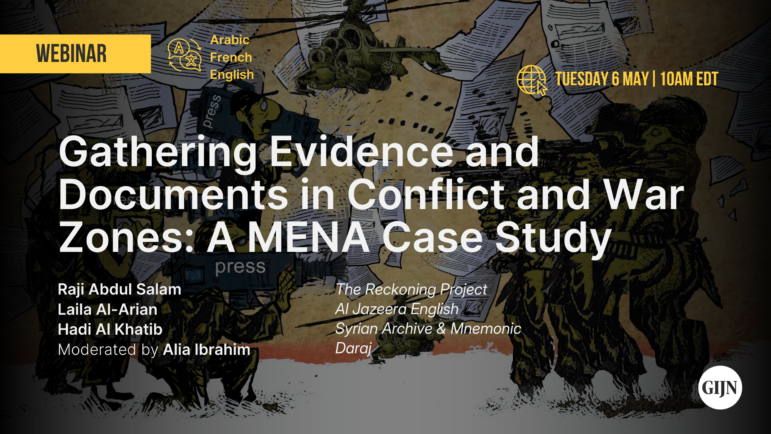
GIJN Webinar: Gathering Evidence and Documents in Conflict and War Zones — A MENA Case Study
May 6, 2025
Read this article in
Journalists working in the Middle East and North Africa (MENA) are often on the frontlines of unfolding tragedies — from Gaza and Sudan to Syria, Yemen to Iraq. In these conflict and post-conflict settings, reporters may be some of the first to encounter potential evidence of war crimes. Their work can go beyond bearing witness and informing the public; it can contribute to accountability efforts and legal processes. But doing so responsibly requires specific skills and a deep understanding of how to collect, verify, preserve, and store sensitive material.
In this GIJN webinar, our panelists explore how investigative journalists can document human rights abuses in war zones, with a focus on methods to ensure the information gathered can later be used by legal investigators or international courts. Drawing from their on-the-ground experience in Syria, Iraq, and Palestine, they share practical tools, ethical considerations, and field-tested techniques for recording testimony, analyzing open source material, and archiving evidence in a secure and legally sound manner.
Raji Abdul Salam is a legal data archive analyst with deep expertise in documenting war crimes, crimes against humanity, and attempted genocides in Syria and Iraq. His forensic review of hundreds of testimonies has supported prosecutions of Syrian war criminals in courts across Europe. Currently chief legal data archivist with The Reckoning Project, Salam specializes in tracking the provenance of evidence, verifying witness statements, and conducting legal-oriented analyses of human rights violations.
Laila Al-Arian is a journalist and senior producer for Al Jazeera English in Washington, DC. She is co-author, with Chris Hedges, of “Collateral Damage: America’s War Against Iraqi Civilians,” based on their Nation magazine investigation, The Other War, which was selected as one of Project Censored’s most important underreported stories of 2008. Al-Arian’s work has appeared in the Guardian, the Independent, The Nation, and other major outlets, and she holds a master’s degree from Columbia University’s Graduate School of Journalism.
Hadi Al Khatib is the founder and director of the Syrian Archive and co-founder of Mnemonic, a nonprofit dedicated to preserving and verifying open source documentation of human rights abuses in conflict zones. Through his work, Al Khatib has helped build bridges between journalists, legal professionals, and civil society organizations to strengthen the use of digital evidence in accountability processes.
The moderator was Alia Ibrahim, CEO and co-founder of Daraj, an independent digital media platform based in Lebanon. A veteran journalist and former senior correspondent at Al-Arabiya, Ibrahim has produced award-winning investigative documentaries and reported for outlets such as The Washington Post, Al-Hayat, and Al-Arabiya.net. She also teaches journalism at the Lebanese American University.
